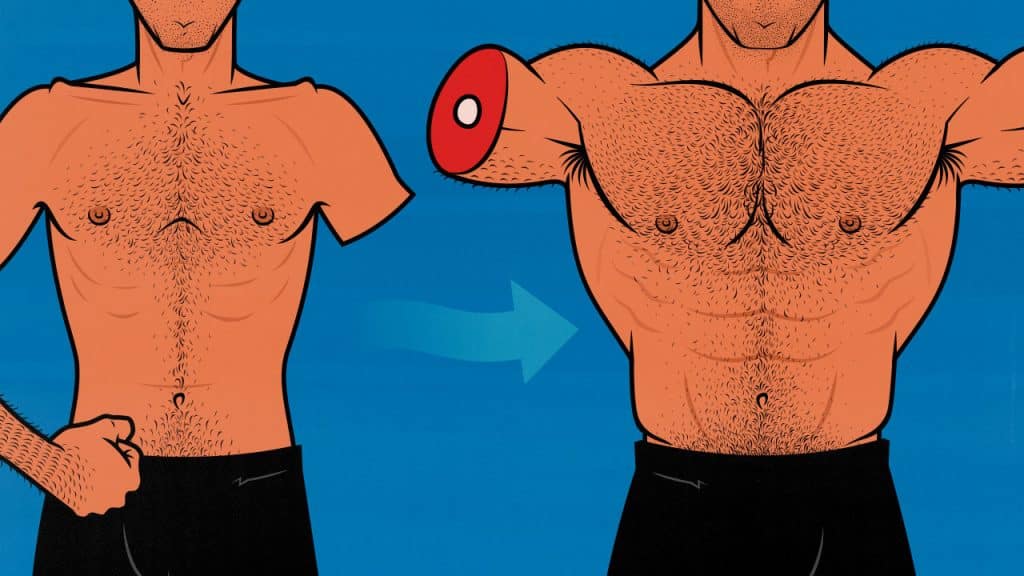
The Skinny Guy’s Guide to Building Bigger Abs
It’s common for skinny guys to be lean and still not have abs. That’s because there are two parts to having good muscle definition: body-fat percentage and muscle size. Our body fat percentage is fine, but our abs aren’t big enough.
If you try to search for information about how to get abs, you’ll probably come across one of two recommendations:
- Abs are built in the kitchen, not the gym: The idea is to focus less on building bigger abs and more on getting lean enough to reveal your abs. But many of us are already lean enough. You might not need to get any leaner. You might do better by gaining weight.
- Abs are built with ab circuits: The most popular ab workouts are high-rep, low-rest circuits. Those circuits will absolutely stimulate muscle growth, but they’re needlessly painful, and they aren’t as effective as hypertrophy training.
Neither of these recommendations is great for us. We need to build bigger ab muscles. We need a proper bulking routine for our abs.
- Why Do Some Skinny Guys Not Have Abs?
- The Shape of Your Abs is Genetic
- The Skinny on Ab Anatomy
- Some Compound Exercises Do Train Your Abs
- The Best Lower Ab Exercises
- The Best Upper Ab Exercises
- The Best Oblique Exercises
- The Best Core Strengthening Exercises
- The Ab Workouts
- How Lean Do You Need to Be to Have Abs?
- Building Bigger Abs Will Make Your Waist Bigger
- Conclusion
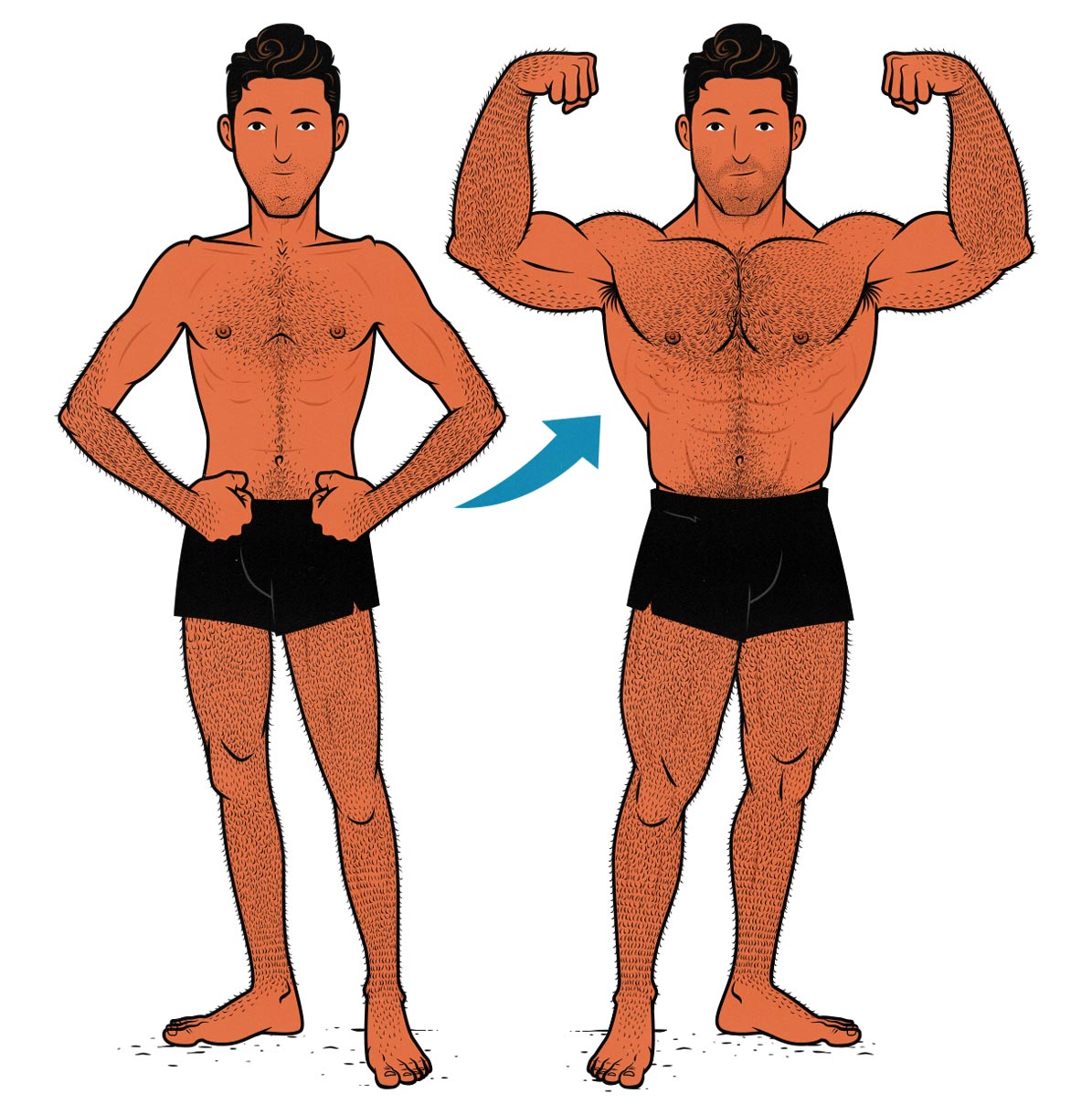
Why Do Some Skinny Guys Not Have Abs?
Some skinny guys don’t have visible abs. If you’ve heard that all it takes to have abs is to cut down to a lower body fat percentage, that can be confusing.
In a way, abs are built in the kitchen. The average person overeats, causing them to gain weight. As they gain more weight, their abs need to grow stronger to support their heavier body, and the huge influx of food provides plenty of nutrients to build bigger muscles. You could say, then, that abs are built in the kitchen. But it’s not dieting down to a low body-fat percentage that builds bigger abs; it’s becoming overweight that builds bigger abs.
However, an overweight person’s abs are hidden underneath a thick layer of fat. To reveal those big abs, then, they simply need to diet down to a lower body fat percentage. When they get down to around 10–15% body fat, their abs begin to show through.
Skinny guys aren’t carrying around a bunch of heavy fat (or muscle). Our abs don’t need to grow all that big to support our lighter bodies. We also don’t have an abundance of nutrients to invest in muscle growth. Even at low body fat percentages, some of us still don’t have abs. It’s not because we aren’t lean enough; it’s because our ab muscles aren’t big enough.
If we want visible abs, we need to build them with hypertrophy training and bulking diets, just like we build the rest of our muscles.
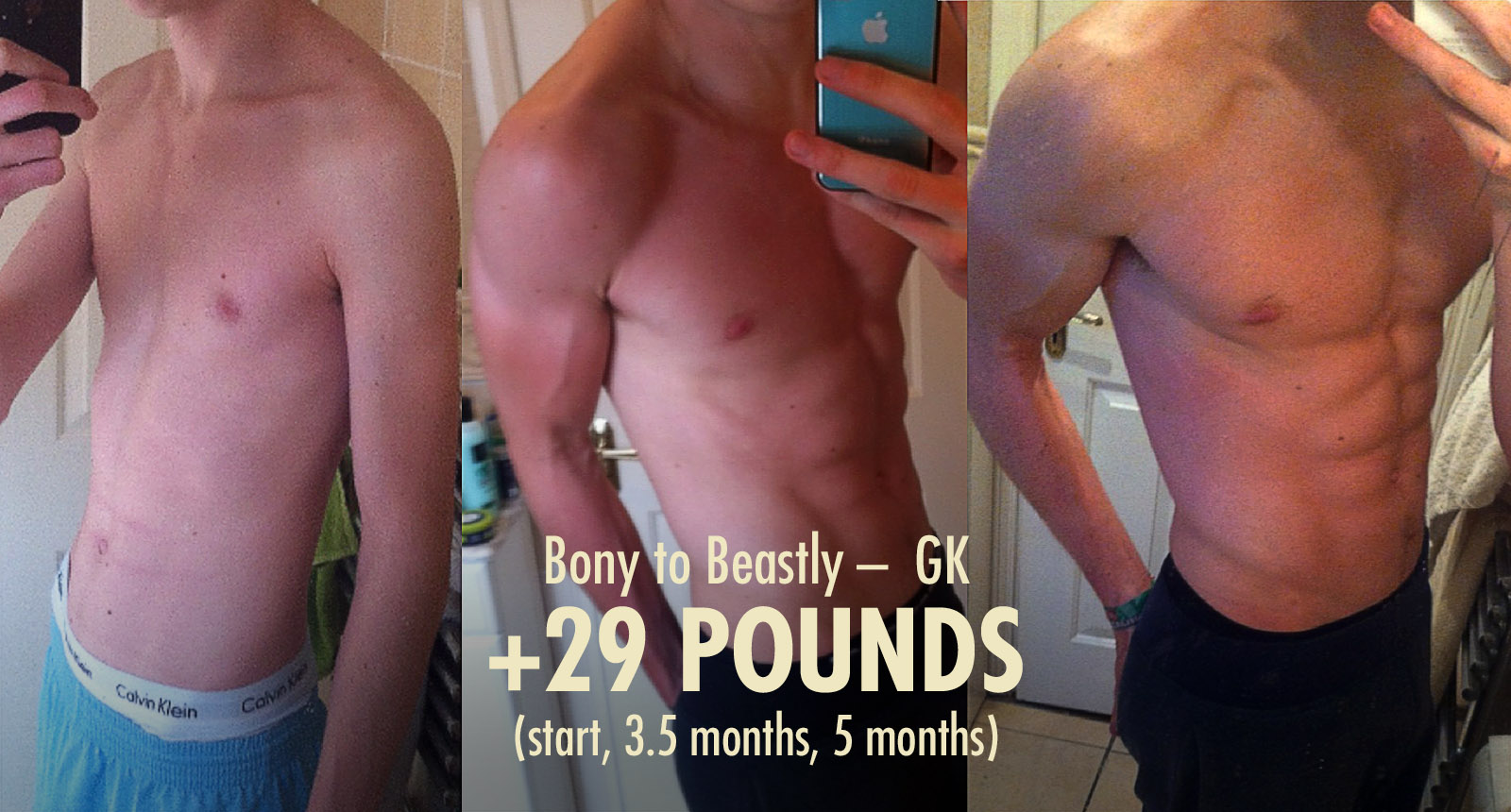
For example, in GK’s before photo, he’s more than lean enough to have abs; they just aren’t big enough to be visible. Although I suppose you could say that his abs were built by eating everything in the kitchen, it’s probably more accurate to say he built them by following a good bulking program.
The Shape of Your Abs is Genetic
As you build bigger abs, you’ll soon notice that they have their own distinct shape. You can make your ab muscles bigger with good training, but you can’t do anything to affect their symmetry or alter the number of tendons you have. Some guys have an 8-pack, others have a 6-pack. Some have a wide pack, others a thin pack.
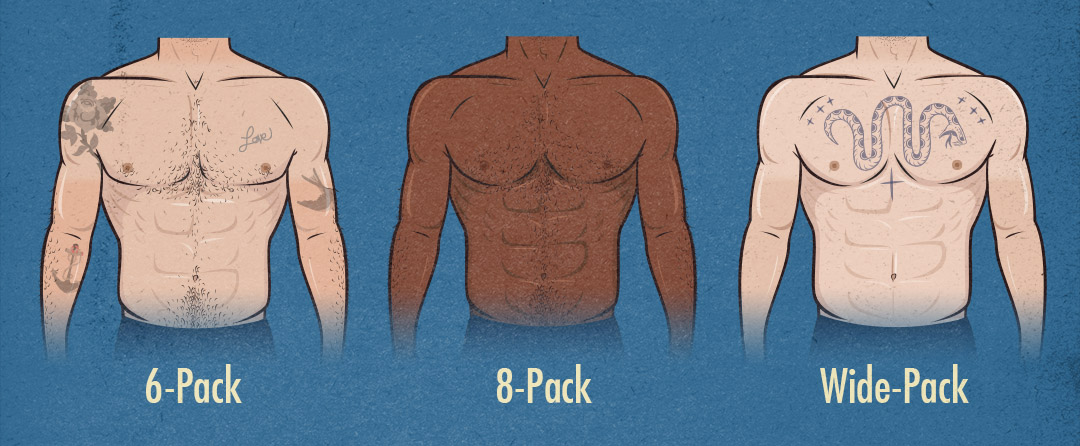
However, in a controversial new study, research has proven what belly dancers have known for thousands of years: with enough coordination, you can target your upper and lower abs (study).
Fortunately, having great abs is just a proxy for being lean and muscular overall. It’s easy to get caught up trying to build the perfect shoulder-to-waist ratio, forgetting that it doesn’t matter how long our collarbones are; it just matters how big and strong our shoulders are. The same is true with ab aesthetics. What matters is being lean and strong.
The Skinny on Ab Anatomy
If you ask someone who’s into strength training how they got their abs, they’ll probably tell you they built them with compound lifts. There’s some truth to that, especially if your workout routine includes plenty of push-ups, overhead presses, and chin-ups. You can build big abs without ever training them directly.
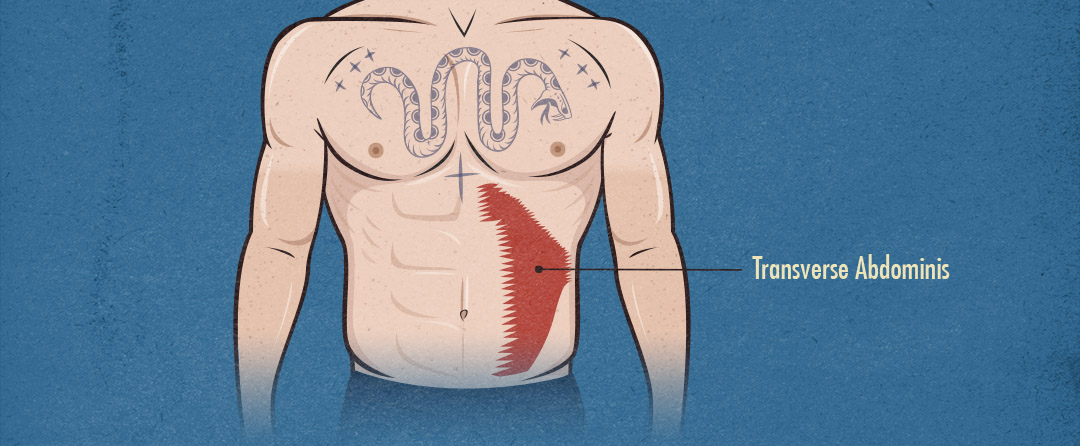
However, most compound lifts emphasize your transverse abdominis. These are the ab muscles you flex when you brace your core. They cinch your waist like a corset, helping to keep it stable. They’re incredibly important when lifting weights. You can’t even do biceps curls if your core has the consistency of an overcooked noodle. Squats and deadlifts are even harder.
Compound lifts aren’t always as good at training your rectus abdominis, which is what gives you a six-pack. Your six-pack muscles are made up of a series of muscle bellies and tendons. The bits that bulge out are the bellies; the canyons between those bulges are the tendons. This gives your abs their unique washboard shape:
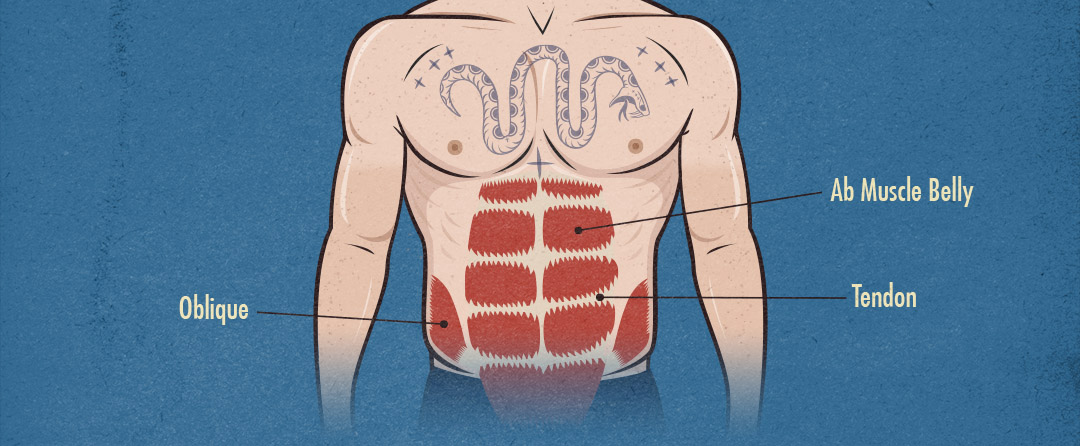
These ab muscles can flex just like any other muscle, allowing you to move your core like an accordion. Your six-pack abs crunch your torso forward, and your obliques twist it to the side. These muscles can also help you resist movement, keeping your ribs and hips in locked down when lifting weights.
Some Compound Exercises Do Train Your Abs
A balanced bulking routine will often do a good job of stimulating your abs. Chin-ups, push-ups, and pullovers all load your abs. Overhead presses can be pretty good, too. Goblet squats and front squats aren’t bad, either. Your abs help you keep your core locked down, keeping your hips and ribs in the proper position.
But indirect training won’t be enough to maximize your rate of ab growth. If you want to build bigger abs faster, it helps to train them directly. That way, you can train them through a deeper range of motion, you can ensure they’re the limiting factor, and you can progressively overload them.
The Best Lower Ab Exercises
The best exercises for your lower abs are the ones that have you lifting your legs, such as hanging leg raises, reverse crunches, and chin-ups. But you’ll fail your chin-ups long before your abs get close to failure, so I recommend including some reverse crunches.
Here’s Marco teaching the reverse crunch:
We’ve got a few other lower ab exercises below, but we’ve put them in the overall core development section. Between reverse crunches and those other core exercises, your lower abs will get all the stimulation they need.
Most guys can’t see their lower abs. The natural assumption is that your lower abs are disproportionately small. That may not be the case. Most men store more body fat on their lower stomachs than on their upper stomachs, so lower abs tend to be murky until you’re very lean—under 10% body fat.
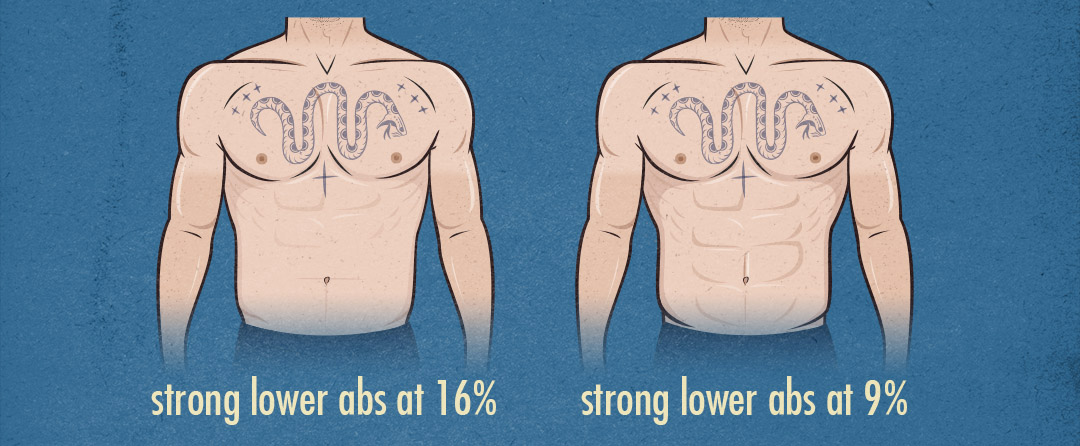
If you fight to get stronger at reverse crunches and/or hanging leg raises, you can be confident you’re giving them all the stimulation they need to grow. From there, make sure you’re eating enough food to support muscle growth. That’s how to make them bigger.
The Best Upper Ab Exercises
The best exercises for your upper abs are the ones that have you crunching your upper body, such as crunches and sit-ups. We recommend starting with sit-ups. They’re a more complete ab exercise than crunches, giving you a bit of hip flexor stimulation as well.
Here’s Marco teaching the sit-up:
We’ve got more upper ab exercises below, but we’re putting them in the postural section because their main function is to help you create a straighter and sturdier torso.
The Best Oblique Exercises
The exercises for your obliques are planks, Pallof presses, and one-arm farmer carries. Planks the best place to start. They teach you how to hold a rigid posture under tension from the side. Here’s a tutorial video:
One-arm farmer carries are great for your upper back, grip, and most of your core muscles, with special emphasis on your obliques. Here’s a tutorial video:
The Pallof press is an even rarer exercise. It’s popular with athletes, but it’s great for building muscle, too. It has you resisting rotation by flexing your obliques. Here’s the tutorial video:
The Best Core Strengthening Exercises
Sit-ups and reverse crunches are great for bulking up your six-pack abs, but it also helps to teach your abs how to maintain proper positioning under load. If you can do that, you’ll stand taller, your stomach will look flatter, and you’ll get much better at lifting weights. You’ll be able to press more weight overhead, squat deeper, and deadlift without as much back strain.
Your posture will also look quite a bit better:
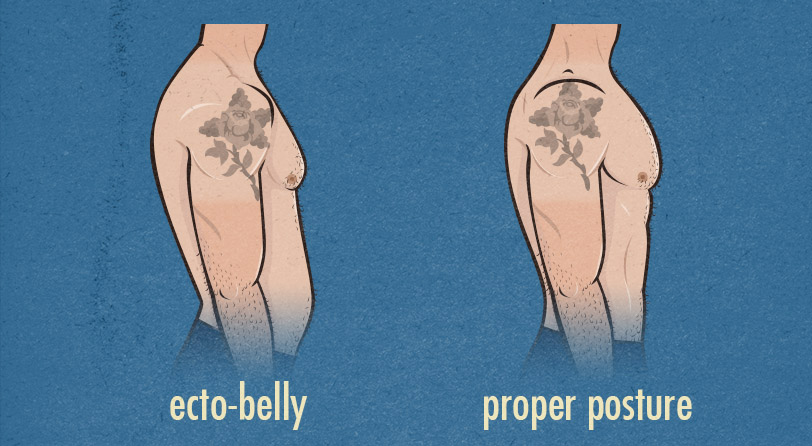
The best place to start is with the humble plank. It’s a great exercise for focusing purely on maintaining a rigid torso under tension. Here’s Marco teaching the exercise:
Once you’ve got the hang of the plank, you can practice moving your arms and legs while maintaining a strong core. The dead bug is perfect for that. Here’s the tutorial video:
Once you’re good at maintaining proper core positioning while moving your arms, you’re ready for exercises like ab-wheel rollouts and pullovers.
Pullovers are more of a back exercise than an ab exercise, but they’re a great way to keep your abs growing while also focusing on other muscles. Here’s a tutorial video:
Note that most people do their pullovers while lying on the bench. That’s perfectly fine. Marco is doing them sideways so that he can engage his core more easily. This is a more classic way of doing pullovers, popular with golden-age bodybuilders like Arnold Schwarzenegger.
The Ab Workouts
There are quite a few ab exercises you could do. I recommend splitting them up over several workouts. You can do them at the end of your workouts or during your rest periods. For example, you could do your planks between your sets of squats or deadlifts.
Your abs are unlikely to be a limiting factor on compound lifts, so training them during your rest periods shouldn’t harm your performance. In fact, many people find that doing planks right before big compound lifts helps them maintain better posture while lifting.
Workout 1
This first workout is the most important. It will train your abs while also helping you develop a stronger posture and better lifting technique. I love supersetting the planks between bigger compound exercises.
| Exercise | Sets | Reps |
|---|---|---|
| Planks | 2–3 sets | Count your breaths |
| Side Planks | 2–3 sets | Count your breaths |
Workout 2
This second workout trains your lower abs, obliques, hip flexors, and most of your other core muscles. Save the farmer carries for the very end of your workout, lest you tire out your grip prematurely.
| Exercise | Sets | Reps |
|---|---|---|
| Reverse Crunches | 2–3 sets | AMRAP |
| One-Arm Farmer Carries | 2–3 sets | 40 steps |
Workout 3
This third workout is for your upper abs, obliques, and hip flexors. You can superset these exercises between compound lifts, but I prefer to do them together, supersetting them with each other.
| Exercise | Sets | Reps |
|---|---|---|
| Sit-Ups | 2–3 sets | AMRAP |
| Pallof Press | 2–3 sets | 5 breaths |
How Lean Do You Need to Be to Have Abs?
Not all skinny guys have a low body-fat percentage. Many do, but you could just as easily be at 15–20% body fat. That’s a perfectly healthy and athletic body-fat percentage, but you probably won’t be able to see your abs, especially if they aren’t very big yet.
- 20% body fat will give most people a reasonably flat stomach. That’s enough to make you attractive to most women, and it’s well within the healthy range, but you probably won’t have visible abs.
- 15% body fat might start to show a hint of upper abs. It depends on the person, and it depends on how big your ab muscles are. The more developed your muscles are, the more likely they are to show through.
- 12% body fat will probably give you abs. These are the beach abs that most people covet. They’re a bit soft, and you need decent lighting for them to show, but you’ve peaks and valleys—there’s muscle definition there.
- 9% body fat gives you chiselled abs. Some bodybuilders and athletes get this lean. Some people can even maintain this degree of leanness all year long. Most people would rather not.
For example, here’s a photo of me cutting down from around 20% body fat (here’s how). I don’t have much of a gut at 20% body fat, but I definitely don’t have visible abs:
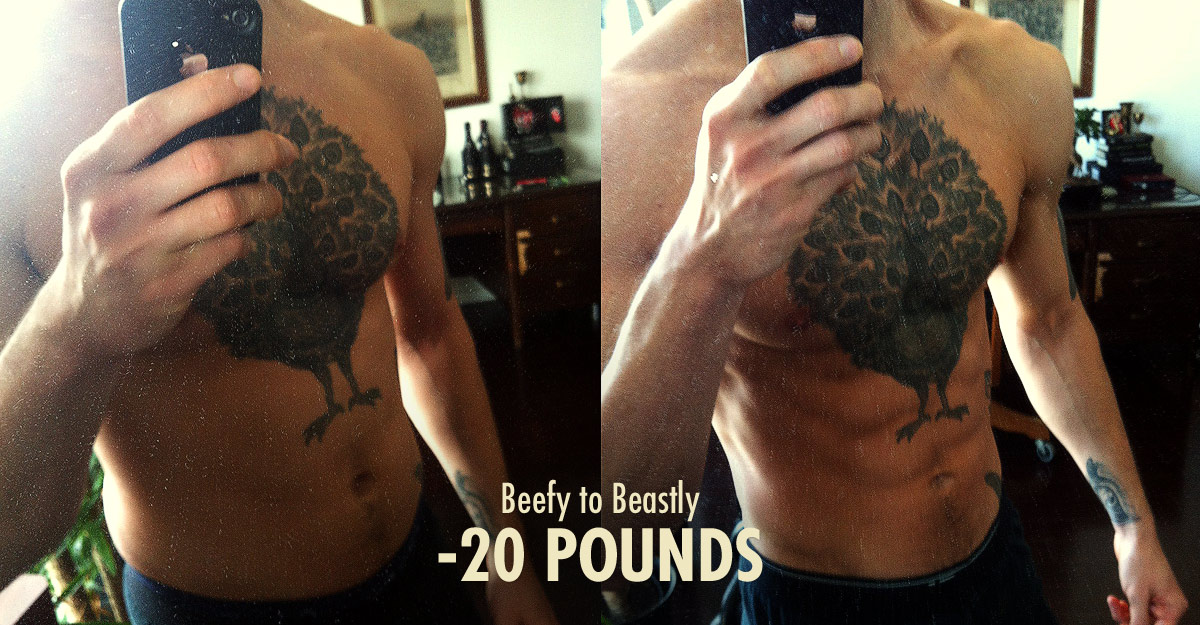
I lost 20 pounds in 3 months, and then I got a DEXA scan to measure my body composition. It put me at 11% body fat:
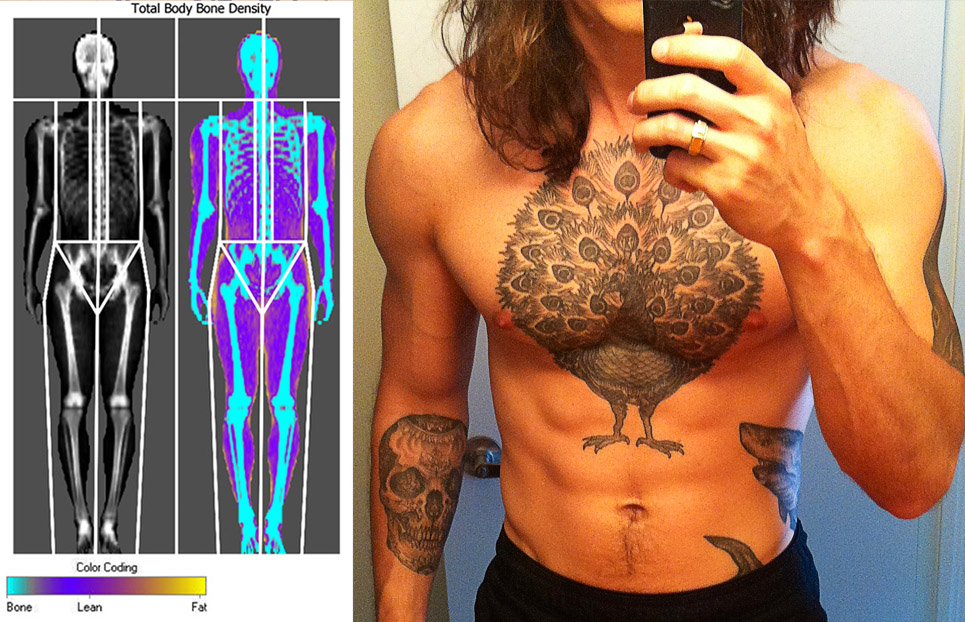
I should point out that you probably shouldn’t use a DEXA scan to track your progress. They aren’t accurate enough for that. The margin of error is about 5% body fat in either direction, so in this case, the DEXA scan is telling me I’m probably somewhere between 6–16% body fat. Visually, though, 11% looks about right.
If you’re curious about how lean you are, here’s an article about how to estimate your body fat percentage.
Building Bigger Abs Will Make Your Waist Bigger
When you train your abs, the muscles will grow, making your waist grow thicker and stronger. Think of how biceps curls and triceps extensions make your arms bigger. When it’s your arms growing bigger, that’s great. When it’s your waist, it’s a bit more confusing.
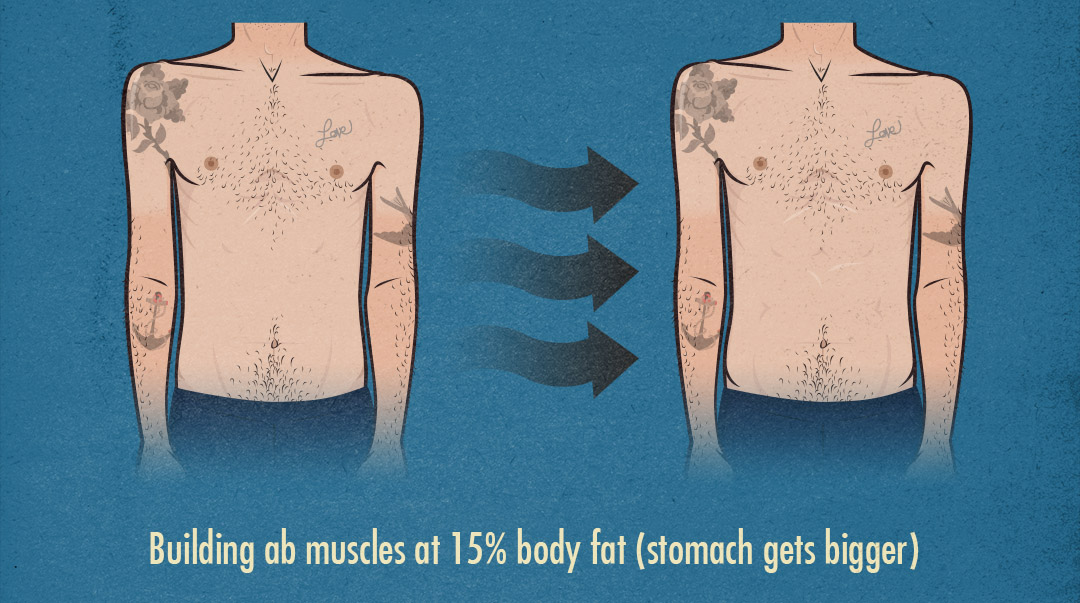
If your waist circumference goes up while bulking, it can be distressing, especially if you already feel like you’re skinny-fat. And you aren’t wrong to worry about a growing waist circumference. That can be a sign that you’re storing fat.
I recommend measuring both your waist and shoulder circumference. Compare the two. If your shoulders are growing much faster than your waist, you’re doing great. Here are the average measurement increases you can expect while bulking. If your shoulders and waist are growing at a similar pace, you might need to improve your workout routine, eat a better diet, live a better lifestyle, or slow your bulk down.
Conclusion
It’s common for naturally skinny guys to have smaller ab muscles. The smaller your ab muscles are, the leaner you’ll need to get for them to show through. And when they do show through, they might look flat. Fortunately, you can bulk up your abs.
- Train your abs just like any other muscle group. The same hypertrophy training principles that apply to your other muscles also apply to your abs. Train them heavy enough and often enough to stimulate muscle growth. Crunches are great for your upper abs. Reverse crunches are great for your lower abs.
- Eat enough good to support muscle growth. Some overweight people can build muscle while losing weight. Skinny people don’t have that luxury. You’ll need to eat a good bulking diet while training your abs.
- Cut down to under 15% body fat to reveal your abs. Once you’ve built bigger abs, you’ll need to trim away enough fat for them to show through. That usually means getting under 15% body fat.
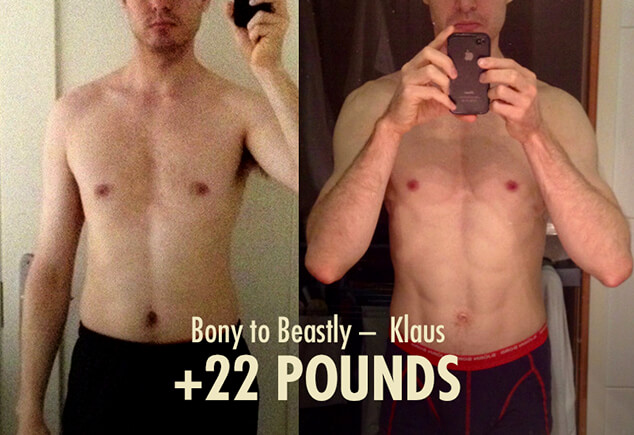
If you want more muscle-building information, we have a free bulking newsletter for skinny guys. If you want a full bulking program, including a 5-month workout routine, diet guide, recipe book, and online coaching, check out our Bony to Beastly Bulking Program. Or, if you want an intermediate bulking routine, check out our Outlift Intermediate Bulking Program.

